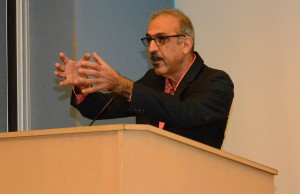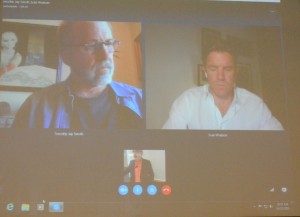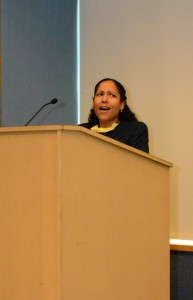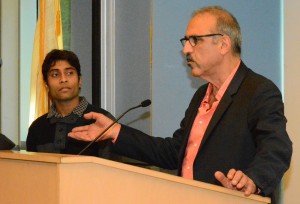- About Ramapo
- Academics
- Admissions & Aid
- Student Life
- Athletics
- Alumni
- Arts & Community
- Quick Links
- Apply
- Visit
- Give
TEACH-IN BRINGS RAMAPO COMMUNITY TOGETHER TO LEARN ABOUT THE MIGRATION CRISIS
(PDF) (DOC) (JPG)December 22, 2015
(MAHWAH, NJ) – On October 23, 2015, The Gross Center for Holocaust and Genocide Studies and the School of Social Science and Human Service sponsored a teach-in, “The Human Dimension of the Migration Crisis.” It was intended to help students, faculty and staff put a human face on the current wave of migration into Europe brought about by turmoil in the Middle East and Africa. Approximately 300 students, faculty and community members attended the event.
Moderator Dr. Michael A. Riff, director of the Gross Center for Holocaust and Genocide Studies, introduced the program by thanking the ad hoc coalition of students, faculty and staff, called into being by Professors Scheckner and Keeton, for their efforts to raise the consciousness of the campus about the migration issue. Dr. Riff emphasized that, as the son of parents who were forced to flee their native Czechoslovakia after German forces overran the country on the eve of World War II, he very much identified with the migrants of today. Like them, all his parents wanted, back in 1939, was to find a place where they could live in safety and have the hope of a better life.
 Behzad Yaghmaian, professor of Political Economy at Ramapo College provided an overview of the migration issue, emphasizing its global and multi-faceted nature. While the main reason for migrants currently rushing to get into Europe is the turmoil in Syria and Iraq, economic dysfunction as well political implosion were dual motivators for people around the world to flee their homes in search of the basics of life somewhere else.
Behzad Yaghmaian, professor of Political Economy at Ramapo College provided an overview of the migration issue, emphasizing its global and multi-faceted nature. While the main reason for migrants currently rushing to get into Europe is the turmoil in Syria and Iraq, economic dysfunction as well political implosion were dual motivators for people around the world to flee their homes in search of the basics of life somewhere else.
With that background in mind, Yaghmaian proposed new international arrangements with regard to migration. They would transcend the 1951 Geneva Convention on Refugees that provides protection only to persons “…who, owing to a well-founded fear of being persecuted for reasons of race, religion, nationality, membership of a particular social group or political opinion, is outside the country of his nationality and is unable or, owing to such fear, is unwilling to avail himself of the protection of that country; or who, not having a nationality and being outside the country of his former habitual residence as a result of such events, is unable or, owing to such fear, is unwilling to return to it.” Fearing that dismantling the current convention could lead to limiting the legal grounds for protection, Yaghmaian proposed creating a parallel convention that would extend protection to persons fleeing states in crisis without endangering the protections afforded by the 1951 convention.
 Joining the conversation by Skype were Ivan Watson, CNN’s senior international correspondent, who has documented the surge of refugees and reported on ISIS, and Timothy Jay Smith, a France-based American author who has been tirelessly working as a volunteer with refugees on the Greek Island of Lesbos. Watson, who spoke first, emphasized the desperation of the migrants he encountered in refugee camps in Greece and Turkey. Echoing an observation of Yaghmaian, he reiterated that all the young men and families he encountered were the least likely recruits for ISIS imaginable. Most were educated, relatively well-off and desperately in search of safety and a better life. Rather than sympathizing with Islamic extremism, they were escaping it. From his vantage point in Hong Kong, he also pointed to the lesser-know migrant crisis in the Pacific involving the Moslem Rohinga minority of Myanmar, who have fled to Thailand and even as far away as the islands off the mainland of Australia.
Joining the conversation by Skype were Ivan Watson, CNN’s senior international correspondent, who has documented the surge of refugees and reported on ISIS, and Timothy Jay Smith, a France-based American author who has been tirelessly working as a volunteer with refugees on the Greek Island of Lesbos. Watson, who spoke first, emphasized the desperation of the migrants he encountered in refugee camps in Greece and Turkey. Echoing an observation of Yaghmaian, he reiterated that all the young men and families he encountered were the least likely recruits for ISIS imaginable. Most were educated, relatively well-off and desperately in search of safety and a better life. Rather than sympathizing with Islamic extremism, they were escaping it. From his vantage point in Hong Kong, he also pointed to the lesser-know migrant crisis in the Pacific involving the Moslem Rohinga minority of Myanmar, who have fled to Thailand and even as far away as the islands off the mainland of Australia.
Timothy Jay Smith, who lives part of the year on Lesbos, and who spontaneously pitched in to help migrants coming ashore on the island, was able to convey how ill-prepared the authorities were to confront a situation that was unpredictably intensifying day-by-day. For example, he described how red tape and lack of preparation prevented the installation of toilets that he himself donated to alleviate the lack of sanitation at the camp closest to his home. According to Smith, even arranging transportation for migrants to the ferry terminal across the island from where they would be transported to the Greek mainland proved to be a bureaucratic and logistical nightmare. In his view, Greek and U.N. officials were overwhelmed by the sheer amount of people who suddenly came ashore on Lesbos and other Greek islands. The situation, according to Smith, was compounded by the arduousness of the migrants’ journeys that often resulted in sickness and the loss of family members.
 Milagros Cruz, the Community Relations Manager at the International Rescue Committee’s (IRC) New York regional office, concluded the program by providing a window into the resettlement efforts of her organization. In so doing, she provided insight into the exhaustive vetting process that migrants from Syria and Iraq undergo before they reach U.S. soil. Cruz emphasized that the most rewarding part of her work is seeing the success that most refugees experience in the U.S.
Milagros Cruz, the Community Relations Manager at the International Rescue Committee’s (IRC) New York regional office, concluded the program by providing a window into the resettlement efforts of her organization. In so doing, she provided insight into the exhaustive vetting process that migrants from Syria and Iraq undergo before they reach U.S. soil. Cruz emphasized that the most rewarding part of her work is seeing the success that most refugees experience in the U.S.
 A Q&A session immediately followed the presentation of Cruz. Students posed questions on subjects ranging from the daily life of refugees on Lesbos and the vulnerability of women along migration routes to the likelihood of Islamophobia and religious fundamentalism influencing migration policy. In response, Yaghmaian recounted how female migrants traveling alone often experienced sexual abuse, while Smith continued to emphasize how over-taxed the authorities and volunteers are by the sheer volume of migrants landing on Lesbos. Smith was, moreover, seriously concerned about the inherent dangers of more turbulent seas and colder temperatures as winter draws closer.
A Q&A session immediately followed the presentation of Cruz. Students posed questions on subjects ranging from the daily life of refugees on Lesbos and the vulnerability of women along migration routes to the likelihood of Islamophobia and religious fundamentalism influencing migration policy. In response, Yaghmaian recounted how female migrants traveling alone often experienced sexual abuse, while Smith continued to emphasize how over-taxed the authorities and volunteers are by the sheer volume of migrants landing on Lesbos. Smith was, moreover, seriously concerned about the inherent dangers of more turbulent seas and colder temperatures as winter draws closer.
Discussion among students and faculty continued on leaving the teach-in. Motivated by her passionate remarks, a bevy of students gathered around Milagros Cruz to inquire about internship opportunities at the IRC.
E-News Archives
| 2023 | 2022 | 2021 | 2019 | 2018 | 2017 | 2016 | 2015 | 2014 | 2013 | 2012 | 2011 | 2010 | 2009 | 2008 | 2007 |Copyright ©2024 Ramapo College Of New Jersey. Statements And Policies. Contact Webmaster.

Follow Us!